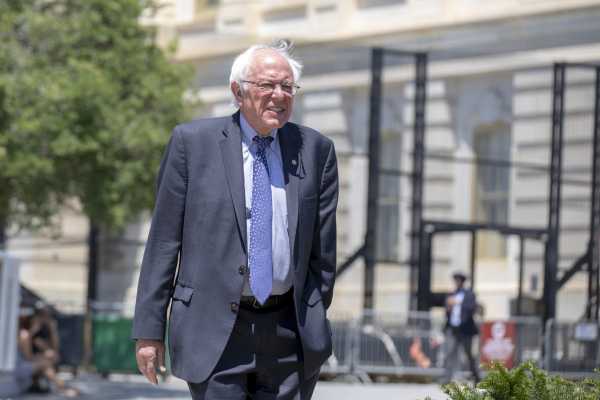
Sen. Bernie Sanders (I-VT) set off a familiar cycle in progressive politics last week when he unveiled his Stop BEZOS Act, a bill to force big companies like Amazon and Walmart to contribute to the cost of social services their low-wage workers use.
Right on cue, a large number of left-of-center academics and professional policy experts — backed up by a range of columnists and Twitter users — denounced the bill as another unworkable Sanders proposal.
Bernieworld clapped back with allegations of corruption. Sanders’s senior policy adviser, Warren Gunnels, tweeted that criticisms of the plan from the Center on Budget and Policy Priorities (CBPP) — progressive Washington’s premier source of policy analysis of poverty and social welfare programs — were motivated by Walmart’s donations to CBPP.
This is one of Sanders’s biggest new policy ideas since the 2016 primary campaign. On the trail, he unveiled a number of once-distinctive ideas that the center left rejected, only to later adopt. It’s a mark of success for Sanders, but it also means he’s got to come up with new ideas to make the case for himself as a unique and necessary figure ahead of the next presidential election cycle. Specifically, he needs ideas that other liberals will reject.
For all the discussion Sanders’s self-description as a “socialist” has created, he’s genuinely neither a socialist nor a social democrat in the European sense. He’s a very American kind of populist whose specific policy proposals are best understood as props in a larger moralistic narrative rather than well-designed cures for specific ills. (It’s best to take him seriously, not literally, to coin a phrase.)
Democrats’ intraparty conflict is partially about ideas and partially about people and who governs them. Sanders and his camp, on a fundamental level, don’t trust the leaders of the Democratic Party or their aligned institutions. They instinctively see criticism as an effort by insiders to freeze him out, rather than a good-faith debate about priorities and proposals.
And the party establishment, conversely, is much more hostile to Sanders personally than they are to his specific ideas — alternately piling on heavily against flawed ones while eagerly co-opting others. And they really, really, really don’t want him to take over.
Taken literally, Bernie’s bill is unworkable nonsense
The main provision of the Stop BEZOS Act (an acronym for “Bad Employers by Zeroing Out Subsidies”) is an attempt to get big companies to raise worker pay. It would impose a tax on any company with more than 500 employees whose workers draw means-tested social assistance benefits — Medicare, food stamps, housing aid, etc. — of $1 for every $1 worth of benefits the workers receive.
But if implemented, it wouldn’t work because of how benefits payments are structured. Instead, it would create a lot of perverse incentives, due to the way benefits eligibility works.
The implicit presumption of Sanders’s proposal is that paying a low-wage worker an extra dollar would result in a dollar less of benefits usage and thus a dollar less of tax burden. Therefore, it would make sense for companies to respond to the bill by paying up.
But in the real world, the programs in question are structured to mostly ensure that $1 in extra earnings does not reduce your benefits by a full dollar. After all, if benefits were fully crowded out, then the programs would massively disincentive working.
This is a sort of a boring technical point, but it’s important: While raising the minimum wage would force employers to pay their low-wage workers more, under the Stop BEZOS Act it would still be cheaper to pay the tax than to hand out raises.
But it gets worse. The proposal conceptualizes low wages as the sole driver of benefits eligibility, but that’s not the case. Benefits eligibility is determined at the level of household income versus household size, which is related to but quite different from hourly wages.
Your household income is determined by your wages, but also by how many hours you work in a year and, crucially, by how much money your spouse makes. Household size, meanwhile, is driven by both marital status and how many children you have. All else being equal, two households with the same income get more benefits if they have more kids.
Consequently while in practice the Stop BEZOS Act would offer only a weak incentive to raise pay, it would offer a very strong incentive to favor hiring married and childless workers over single workers and parents.
The bill attempts to prohibit employers from directly discriminating against benefits-eligible hires. But it would be almost comically easy to engage in successful “statistical discrimination” against people who are likely to be benefits-eligible (single parents and young, unmarried women with limited education) and at best generate a morass of litigation.
Last but by no means least, benefits eligibility varies by state. Under Sanders’s proposal, employers in a liberal state like Vermont would face very high tax bills because Vermont has expanded Medicaid eligibility up to 138 percent of the poverty line. Employers in a stingy state like Texas could combine lower wages and a lower tax bill thanks to Austin’s much more restrictive benefits packages.
Sanders very clearly does not believe that states should be making their public sector health insurance programs stingier, but in a practical sense, his legislation would create a huge incentive to do that.
Back in the real world, Sanders is trying to make a point about Amazon — not craft a bill that makes sense.
Bernie is waging a larger war on Amazon
Dating back to before the release of this bill, Sanders has been waging a multi-front campaign against Amazon. He argues that there’s something fundamentally obscene about the legion of workers toiling away for low pay in often bleak conditions in its warehouses while the founder of the company becomes the richest man on the planet.
The legislation itself is clearly meant to put some policy meat on the bones of that moralistic point, but in addition to being poorly designed, it also targets a much larger universe of companies than just Amazon; there are more than 18,000 firms with 500-plus employees, and they collectively employ about half of all US workers. And Sanders’s thoughts about Amazon go well beyond the pay levels.
Indeed, though Amazon warehouse workers are obviously not getting rich, the company does pay meaningfully above minimum wage for those jobs. For that matter, so does Walmart with its $11-an-hour entry-level salary. Critics of Amazon typically point to brutal working conditions, which is a subject Sanders has also discussed recently but that the Stop BEZOS bill does not address in any way.
Meanwhile, it’s fairly clear that a big part of Sanders’s outrage about Amazon is specifically about inequality; Jeff Bezos is the richest man in the world. Walmart is also noteworthy because the Walton siblings, heirs to the company’s founder, are collectively the richest family in the world.
But, of course, lots of low-wage workers are toiling away for companies whose owners aren’t nearly that rich. Indeed, research shows that chains and big-box stores generally pay higher wages than mom and pop retailers.
Rather than thinking systematically about the structure of low-wage work in America or the general plight of low-income households, Sanders is keying in on the morally outrageous juxtaposition of vast fortunes and bleak prospects for workers. (As Matt Bruenig shows at Demos, the vast majority of poor people don’t have full-time jobs at all, and in most cases can’t realistically get one.)
But that inequity is addressed much more effectively by other tools, tools that both Sanders and his critics in progressive wonk world agree on.
Sanders’s other ideas would make this unnecessary
Sanders’s critics on the right would say that the whole idea of the government stepping in to try to force employers to pay higher wages is silly, and that means-tested social assistance programs should be cut to encourage low-income workers to learn the value of self-reliance.
But his supporters on the left would say that they share Sanders’s goals, while simply believing there are more effective ways to accomplish them. The odd thing about the debate is that Sanders himself supports those more effective alternatives.
Sanders’s Medicare-for-all proposal, for starters, would eliminate Medicaid’s existence as a separate program for poor families, thus in one stroke getting rid of the most expensive means-tested social program. Raising the minimum wage to $15 an hour, meanwhile, might have downsides in terms of reducing the pace of job creation. And it would unquestionably create a situation in which virtually every full-time worker earned too much money to be eligible for SNAP (food stamps) or housing vouchers.
And the most direct approach to tackling the problem of Bezos’s vast wealth — if you think it’s a problem — is to levy higher taxes on rich people, which Sanders certainly supports. He’s also on the record as supporting making the earned income tax credit more generous and making the child tax credit fully refundable. Both of these would directly target poverty much more effectively than the Stop BEZOS plan because they are scaled to family size.
None of these ideas are about to pass in Congress tomorrow. But all of them have considerably more support from elected officials and the left-of-center policy community than the Stop BEZOS Act. Plus, their passage would make the proposal irrelevant.
Since it’s basically impossible to imagine a scenario in which Stop BEZOS passes without redundant, but more effective, alternatives already passing, the Sanders camp is not too worried about whether all the i’s are dotted and the t’s are crossed on their plan.
It’s a message bill whose main point is to highlight Sanders’s criticisms of Amazon’s labor practices. Whatever you think of the merits of the legislation, you have to admit that introducing such a provocative bill earned Sanders a lot more attention than he would have received for simply reiterating his support for a higher minimum wage and a more generous EITC.
In doing so, he managed to successfully emphasize some of the ways he is most distinct from other progressive Democrats in the US Senate.
Democrats have moved Bernie’s way — a mixed bag for Sanders
Hillary Clinton had some daunting advantages over Sanders in the 2016 primary, but the dynamics of that campaign also left him with a lot of open space to play in. Clinton had voted to authorize the invasion of Iraq, her husband’s administration was associated with NAFTA and “tough on crime” policies, she was personally involved in negotiating the Trans-Pacific Partnership, and she spent President Barack Obama’s second term doing off-the-record buckraking speeches at big banks.
If Sanders runs again in 2020, he’ll be up against a phalanx of rival Democrats who, like most Democrats, are not guilty of the sins he painted Clinton with.
Meanwhile, his three highest-profile policy proposals from that campaign — Medicare-for-all, free college, and a $15 minimum wage — have all been widely adopted by other Democrats.
One virtue of the Stop BEZOS Act, in that context, is that it puts distance between Sanders and his adversaries. It does so in part on the level of policy, but also, importantly, on the level of affect. Sanders is a politician who relishes a fight against the plutocracy, and who, even in the Trump era, regards a guy like Jeff Bezos primarily as the class enemy founder of Amazon rather than a pillar of civil society who owns the Washington Post.
And then there’s the question of the act’s relationship to experts and the mainstream media.
Way back in 1980, President Ronald Reagan promised that he could cut taxes, increase military spending, and balance the budget. These claims were regarded as outlandish at the time because they’re ridiculous, but Republicans George H.W. Bush, Bob Dole, George W. Bush, John McCain, and Mitt Romney all ran on the same promise.
By the time Donald Trump ran on the platform in 2016, it hardly seemed noteworthy. During the 2017 “tax reform” debate, congressional Republicans uniformly shrugged off questions about the budget deficit by professing to believe that a large tax cut would — by magic, or something — reduce the deficit. When subsequent deficit numbers came in, nobody was surprised or embarrassed.
It’s not that no competent economists or tax policy analysts work in Republican Party politics. It’s just understood that policy experts play a subordinate role in the coalition. They are not supposed to scold elected officials about basic errors of math or logic — they’re expected to try to constructively shape policy behind closed doors after elections are won.
And because the mainstream press takes its cues from the communities of partisan experts, a Romney or a Paul Ryan can garner a reputation as a wonky numbers guy while spouting total nonsense. On the other side, Sanders obtains a reputation for economic illiteracy in virtue of taking hits from Democrats’ more vocal wonk community.
To some left-of-center Americans, Trump’s rise to power illustrates the weakness of the conservative approach in which a no-guardrails and bullshit-soaked political culture left the party open to a takeover by a canny fraudster.
But to others, it suggests the party should stop playing the sucker’s game of treating electoral politics like an academic seminar where you need to acknowledge trade-offs, make your numbers add up, and defer to media fact-checkers.
Most Democrats would be saddened to see a signature proposal denounced by the CBPP and characterized by Vox as “unworkable nonsense.” Sanders almost certainly won’t care, and part of the core of his appeal is a sense that this is the correct and appropriate way to think about politics.
Sourse: vox.com






